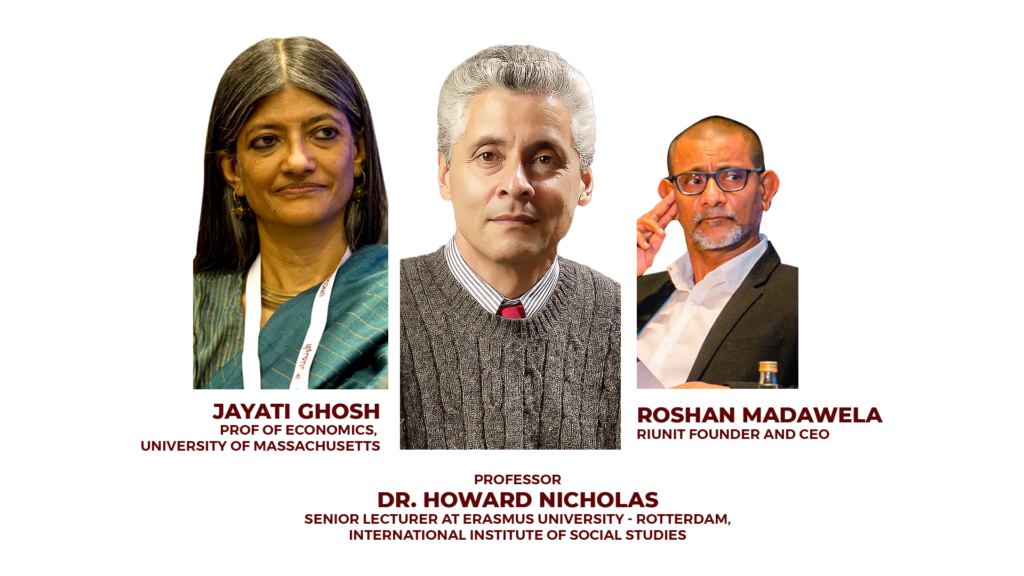
In the latest RIUNIT podcast, hosted by Roshan Madawela, distinguished economists Prof. Howard Nicholas and Prof. Jayati Ghosh offer a comprehensive analysis of the rapidly evolving global economic landscape. As they navigate the complexities of local and global economic systems, they challenge prevailing narratives and shed light on the underlying forces shaping the world today.
Rising inequality and wealth concentration
The discussion begins with a stark portrayal of rising global inequality and the concentration of wealth. Roshan Madawela highlights alarming statistics from an Oxfam report, pointing out that the richest 1% accumulated nearly twice as much wealth as the rest of the world combined in the two years leading up to 2023. Madawela notes that billionaire fortunes have been growing at an unprecedented rate of $2.7 billion per day. He emphasizes that taxing just 5% of the world’s multi-millionaires and billionaires could generate $1.7 trillion annually, enough to lift 2 billion people out of poverty.
Prof. Jayati Ghosh echoes these concerns, drawing parallels with Karl Marx’s concept of the “anarchy of capitalism.” She explains that wealth concentration is not limited to individuals but also extends to the relationship between the private and public sectors. “Private wealth has surged at the expense of public wealth, diminishing governments’ ability to provide essential services,” Ghosh remarks, highlighting the growing power imbalance.
Comparative analysis of capitalism
Prof. Howard Nicholas provides a comparative analysis of capitalism, focusing on countries like China and Vietnam, where real wages have kept pace with per capita income growth. He contrasts this with India, where monopolistic tendencies are driving up share prices but stifling genuine market growth. Nicholas observes, “China and Vietnam, despite being capitalist, are led by forward-thinking leaders who encourage vibrant competition and technological advancement. Conversely, many advanced nations and India are experiencing monopolistic tendencies.”
Prof. Ghosh adds that China and Vietnam practice a form of state-led capitalism that fosters competition and innovation. In contrast, India’s economic model is characterized by capital-led state monopolies, which explain the varied economic outcomes in these regions. The discussion highlights the differing approaches to capitalism and their impact on economic development.
The consequences of privatization
The conversation then shifts to the consequences of privatization, with Prof. Ghosh citing the United Kingdom as a cautionary example. She argues that neoliberal policies have dismantled state-led capitalism in the UK, giving undue power to large capital entities. “This has led to asset stripping and deteriorating services in essential sectors like water and railways,” Ghosh remarks.
Prof. Nicholas supports this view, pointing out that the UK government often ends up nationalizing failing enterprises, as seen with the railways. “This cycle benefits corporations at the public’s expense,” he notes, underscoring the unintended consequences of privatization.
IMF policies and their impact on developing economies
The economists also examine the International Monetary Fund’s (IMF) impact on developing economies, with a particular focus on Sri Lanka. Prof. Nicholas criticizes the IMF’s deal with Sri Lanka, describing it as “deeply unequal” and imposing harsh conditions that favor bondholders. He warns that future Sri Lankan governments will be constrained by the IMF’s governance-linked bonds, leading to deflationary policies.
Prof. Ghosh concludes that Sri Lanka’s situation resembles a “Greek tragedy,” with the IMF deal focusing on cutting public services and restructuring domestic debt. She argues that this approach disproportionately affects the poor and benefits bondholders, even if GDP growth remains minimal. The discussion highlights the broader implications of IMF policies on developing economies.
Troubling global economic indicators
Turning to global economic indicators, Prof. Nicholas expresses concern over troubling signs such as declining profits, rising unemployment, and the slowdown in industrial metals like aluminum, copper, nickel, and zinc. He notes that a rise in US unemployment, following a low, often precedes a recession, and the recent deterioration in China’s manufacturing sector, along with weaknesses in Europe and Japan, poses a significant risk. Nicholas concurs with forecasts predicting a global recession in early 2025.
The fragility of global capitalism
Prof. Ghosh emphasizes the fragility of the global economy, explaining that the global economy has been fragile not just since the COVID-19 pandemic but also since the recovery from the global financial crisis. She describes India as “internally hollow,” a characteristic she associates with global capitalism, which has been sustained by extensive monetary policies and fiscal expansions benefiting the global elite with limited trickle-down to real wages.
About RIUNIT
RIUNIT is dedicated to fostering informed discussions on critical economic and social issues. Through engaging podcast episodes, RIUNIT brings together experts, policymakers, and thought leaders to share insights and perspectives on pressing global challenges.
For more information, visit RIUNIT’s website and tune in to the latest podcast episode. https://riunit.com/podcasts/
Disclaimer: The views expressed in this podcast are those of the participants and do not necessarily reflect the views of RIUNIT.
Written by Nirikshani Mendis (Junior Economist, RIUNIT)

